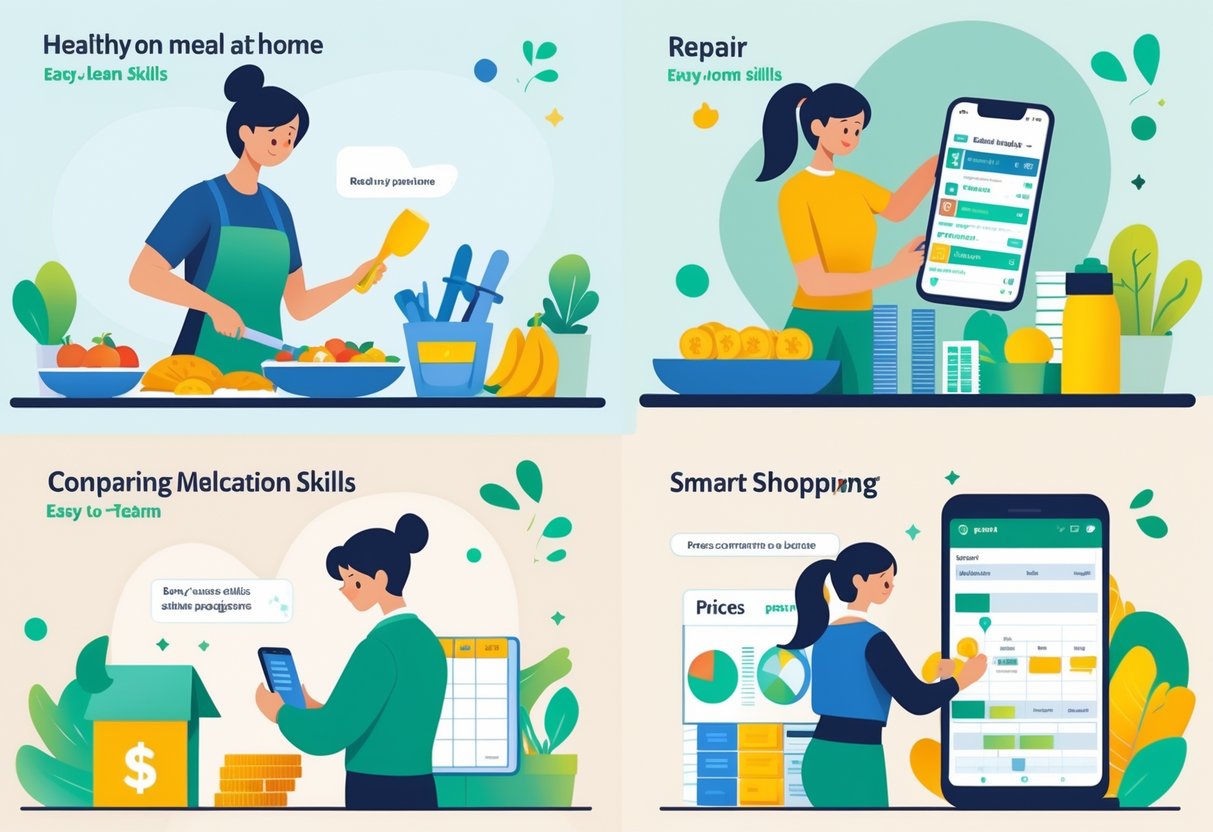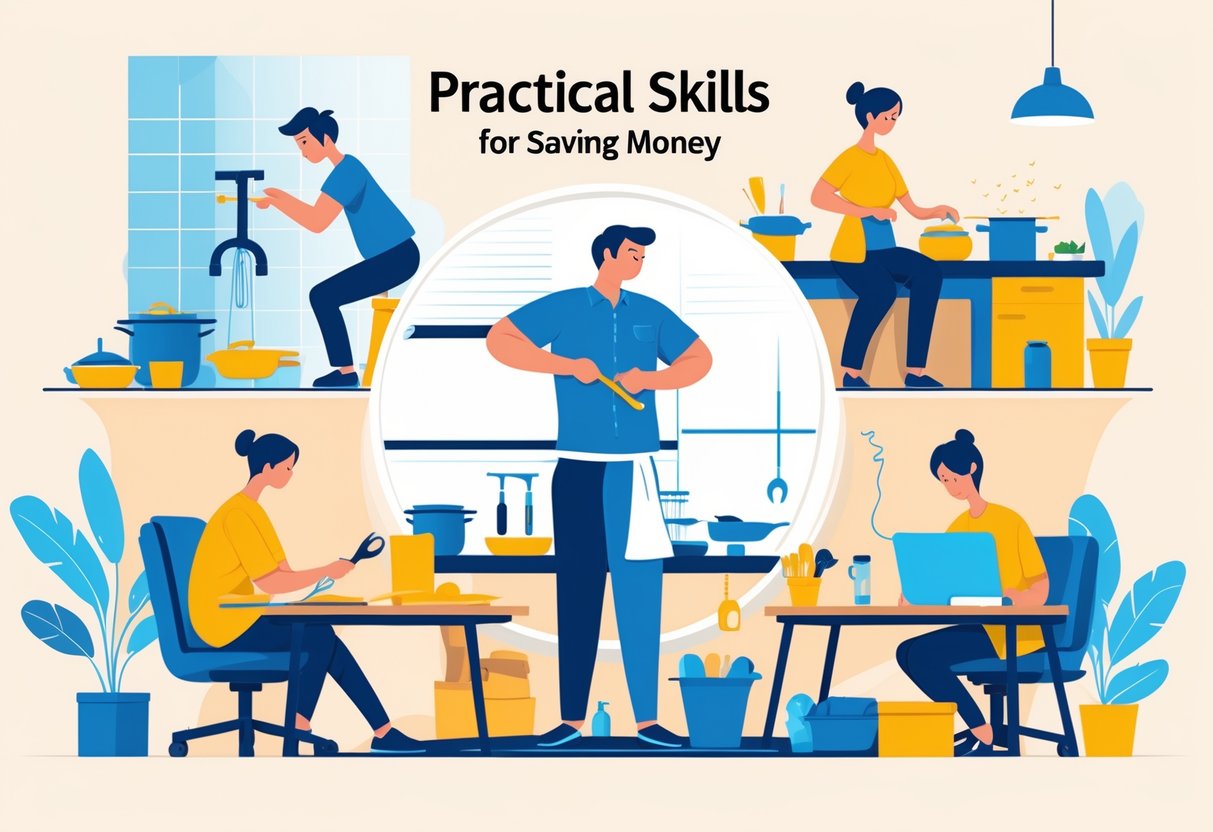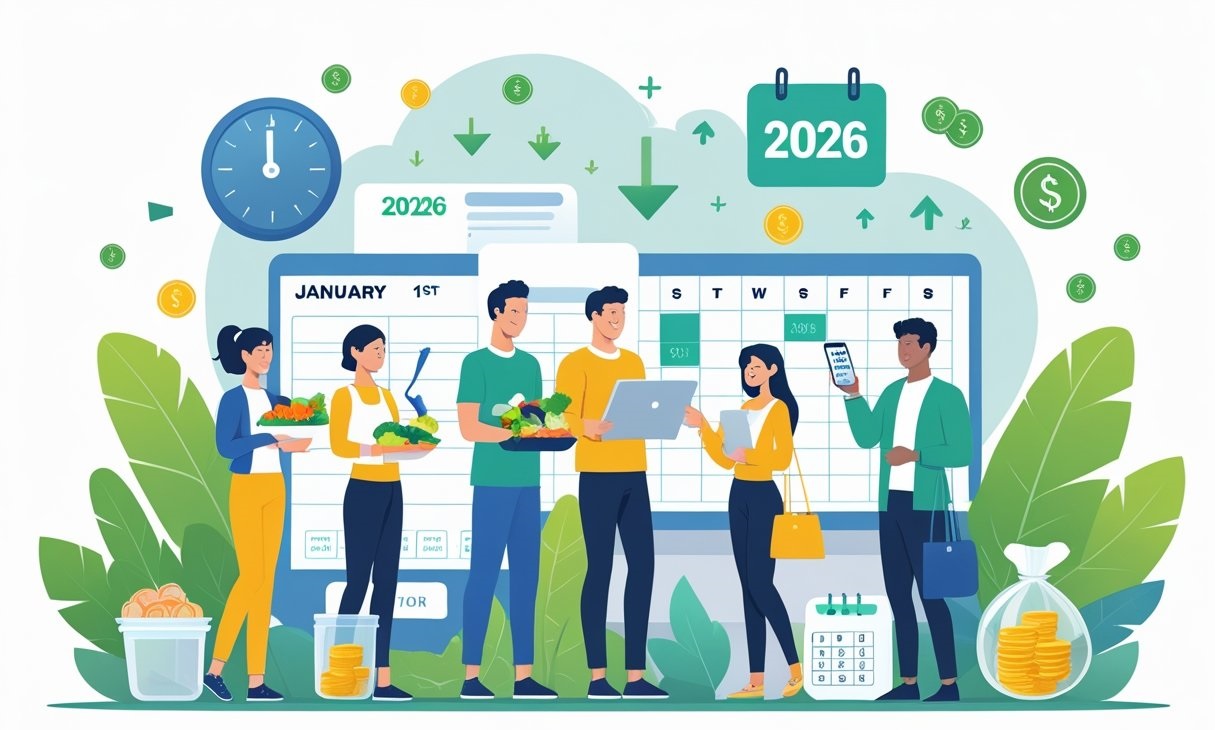Commercial cleaning products are loaded with harsh chemicals. They can irritate your skin, trigger allergies, and honestly, the costs pile up fast.
4 Easy to Learn Skills That Will Save You Money and Build Financial Independence
Most of us shell out cash for stuff we could easily handle ourselves, if we just knew how. Picking up a few practical skills can slash your household expenses by hundreds—sometimes thousands—every year.
These money-saving abilities range from home repairs to food prep and managing your budget. It's not rocket science, but it can make a huge difference.

The most effective money-saving skills tackle the expenses we hit all the time. Get comfortable with meal prep, budgeting, basic repairs, or even growing your own food, and you'll dodge a lot of those "convenience" costs.
Most of these skills take a little time upfront, but the payoff keeps coming for years. And honestly, it feels good to be less reliant on outside help.
1) Basic Cooking and Meal Planning
Basic cooking skills save real money over time. People who eat at home just spend less, plain and simple.
Start with easy stuff like boiling, roasting, or stir-frying. You don't need fancy gadgets—just a few kitchen basics get you far.
Stews and soups are forgiving for beginners. They're hard to mess up, and you get a bunch of meals out of one pot.
Meal planning barely takes 15 minutes a week if you keep it simple. That tiny effort stops you from buying random junk or letting food rot in the fridge.
Families can save up to $500 a month just by planning ahead. Shopping with a list helps you dodge pricey last-minute meals.
Set a clear budget for your groceries. Picking the cheapest options in each category stretches your dollar further.
If you're cooking for a group, the savings really add up. Leftovers are a lifesaver—less cooking, more value.
2) Budgeting and Personal Finance Management
Budgeting is the backbone of good money management. When you know where your cash goes, you can spot leaks and patch them up.
The best method? Track your expenses first, then build a budget that includes savings. It's eye-opening (and sometimes a little painful) to see where your money really goes.
People who budget well split their money between essentials like rent, food, and savings. They also leave a little wiggle room for surprises.
Setting goals and saving at least 15% of what you make is a solid move. That covers emergencies and helps with retirement down the road.
Apps and auto-transfers make budgeting way easier. Letting your bank move money to savings every month means you don't have to think about it.
Learning about debt, investing, and retirement pays off big if you stick with it. These aren't things you master overnight, but small steps add up.
Honestly, even tracking your spending with a notebook can be a game changer. You might be surprised by what you find.
Checking in on your budget regularly helps you stay on track—life changes, and your money plan should too.
3) DIY Home Repairs and Maintenance
Pick up basic home repair skills and you can save hundreds—or even thousands—every year. A lot of common household problems aren't as hard to fix as they seem.
Patching drywall, unclogging drains, fixing leaks—these are things anyone can learn. Hiring someone for these jobs can cost a fortune, but you just need a few tools and a little patience.
Loads of free online tutorials and videos walk you through repairs step by step. YouTube, manufacturer sites, and DIY blogs are goldmines for this stuff.
Don't ignore the basics like plumbing or swapping out a light switch. These jobs look intimidating, but with some practice, you'll surprise yourself.
Start with easy projects like caulking or painting touch-ups. Keeping up with little things prevents bigger, pricier problems later on.
4) Gardening for Homegrown Produce

Growing your own food cuts grocery bills and gives you fresh ingredients year-round. Some crops pay for themselves fast, especially if you start from seed.
If you're new, try high-value veggies like lettuce, tomatoes, herbs, and peppers. They don't take much space and give you a lot back for your effort.
Seeds are way cheaper than buying starter plants. Swapping seeds or collecting rainwater can keep your setup costs low.
Learn to test your soil, compost, and handle garden pests without pricey chemicals. It's not always glamorous, but it's worth it.
Herbs like basil or cilantro are pricey at the store but easy to grow at home. Even one plant can keep you stocked for months.
If you don't have a yard, container gardening is a solid option. Tomatoes and greens do great on a sunny balcony or patio.
The Value of Practical Skills for Saving Money

Learning hands-on skills pays off in real dollars by cutting service costs and making you more self-reliant. The savings add up, and honestly, it's empowering to know you can handle stuff on your own.
Long-Term Financial Impact
Even basic skills can save you a surprising amount over time. If you tackle your own home repairs, you might keep $2,000-5,000 a year in your pocket.
Annual Savings Potential:
- Basic car maintenance: $800-1,200
- Home repairs: $1,500-3,000
- Cooking from scratch: $2,400-4,800
- Clothing alterations: $200-600
Over decades, those numbers really pile up. If you save $3,000 a year, you're looking at $90,000 in 30 years—and that's before any investment gains.
Knowing how to fix things means you don't have to call in a pro for every little problem. Why pay $150 for a plumber when you can handle a leaky faucet for $20?
Understanding the basics also helps you avoid big mistakes. You'll know when to call for help and when it's something you can handle for cheap.
Empowerment Through Self-Sufficiency
Practical skills give you confidence to handle life's curveballs. If you can fix your own stuff, you worry less about surprise expenses.
Being self-sufficient means you don't have to scramble (or pay a premium) when things break. You can often fix things right away, on your own terms.
Key Benefits:
- Immediate problem resolution—no waiting around for help
- Better control over how things get fixed
- Flexibility to handle repairs when it fits your schedule
- Passing skills on to family and friends
Money-saving skills can even turn into side income. Some people help neighbors or pick up odd jobs for extra cash.
Plus, there's something satisfying about solving problems yourself. It builds your confidence and takes a bit of stress out of daily life.
Tips for Continual Improvement
Building these skills takes practice and a little curiosity. Use free resources, keep an eye on your progress, and don't stress about getting everything perfect the first time.
Leveraging Free Resources
YouTube has thousands of tutorials for practical skills—think basic plumbing, cooking techniques, or car maintenance. Plenty of creators break things down step by step, and honestly, some of these free videos rival paid courses.
Public libraries aren't just about books anymore. They've got magazines, online databases, and resources for financial planning or DIY skills.
Most libraries also run free workshops on stuff like tax prep or home repair. If you're lucky, you might even find a librarian who loves giving advice.
Community colleges sometimes host free seminars on personal finance or practical skills. These sessions can get pretty hands-on, and you'll often get guidance from someone who's been there.
Online platforms worth exploring:
- Khan Academy for financial literacy
- Coursera's free audit options
- Library databases like Lynda.com access
- Local utility company energy-saving workshops
Government websites have surprisingly useful guides on things like home weatherization and energy efficiency. The Consumer Financial Protection Bureau puts out free resources for budgeting and debt management.
Social media groups and forums let you connect with people who actually know what they're doing. Reddit communities, in particular, tend to share detailed advice and troubleshooting tips for whatever skill you're trying to pick up.
Tracking Your Progress
Setting measurable goals keeps motivation alive and makes it easier to spot areas that need work. Instead of vague objectives, it's better to set specific targets—something like, "save $200 monthly through meal prep."
Monthly spending reviews can show which new skills actually save you the most money. Tracking apps like Mint or YNAB help you sort expenses and see your progress right there in the numbers.
Key metrics to monitor:
- Monthly savings from each skill
- Time invested versus money saved
- Frequency of skill usage
- Confidence level improvements
Honestly, a simple spreadsheet does wonders for tracking learning milestones and the real financial impact. You can jot down practice sessions, successful projects, and how much you saved with each activity.
Regular self-assessment makes it obvious which skills could use more work. Planning out improvements keeps you moving toward your financial goals—even if it's not always a straight line.
Taking before-and-after photos of DIY projects? That's a great way to see your own progress. Visual proof builds confidence and helps you tweak your techniques as you go.
The start of a new year always feels like a fresh shot at getting your money right. It's a chance to look at how you've been spending and try some changes that could actually stick.
The holidays bring joy and connection, but let's be honest—they can bring financial headaches too. Plenty of families overspend at Christmas, and nobody wants debt hanging around in January.



